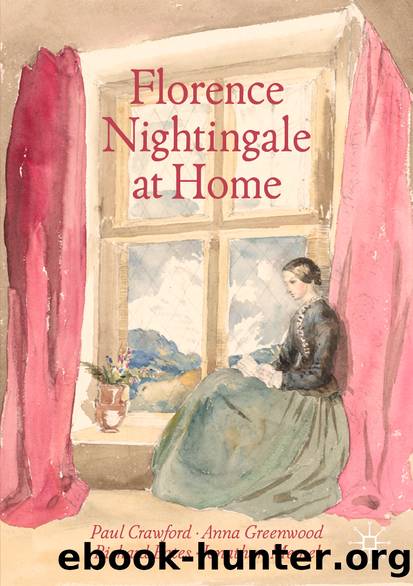Florence Nightingale at Home by Paul Crawford & Anna Greenwood & Richard Bates & Jonathan Memel

Author:Paul Crawford & Anna Greenwood & Richard Bates & Jonathan Memel
Language: eng
Format: epub
ISBN: 9783030465346
Publisher: Springer International Publishing
Her conclusion was that no patient should be allowed to stay in the house for longer than two months, âunless there be prospect either of improvement or of deathâ. If this rule were not implementedâshe argued in her report of February 1854ââthis will become not a hospital for the sick, but a hospital for incompatible tempers and for hysterical fancies ⦠A hospital is good for the seriously ill alone â otherwise it becomes a lodging house where the nervous become more nervous, the foolish more foolish, the idle and selfish more selfish and idleâ.79 Over the following three months, she discharged three patients labelled âhysterical, no improvementâ, and four more âcured of complaints which never existedâ.80 In other cases, she intervened to find her patients long-term places in other institutions.81 âThere have been admitted many cases which proved to be unworthy of the charityâ, she argued in her May report.82
There was probably a part of Nightingale that felt that she had not left country house life and her nervously hypochondriac sister behind merely to spend the rest of her days ministering to the over-dramatised complaints of underemployed gentlewomen. But she was also seeking to draw a distinction: a hospital was not a home, and should not be treated as such. The problem was that it was not clear which categoryâhospital or homeâHarley Street fitted into. It had hospital-like elements, with some patients admitted for short-term surgical or medical procedures. Nightingale wanted the Establishment to prioritise this aspectâshe attended every operation that took place thereâto assist her in establishing a nursing training institute.83 Many of the patients (or their families), however, saw the Establishment as a residential care home. Thus, a significant proportion of its residents were women who were not in need of hospital care, but âwho have wearied out their families, or been wearied out by themâ, or simply those âwho have no families at allâ.84 Nightingale seems to have wanted the Establishment to cease catering to such women.
A third category were those who were undergoing extended recovery from surgery or illness and âanxious to return to their families and save them expenseâ.85 These too did not belong in a hospital environment, Nightingale felt. By the time she came to write Notes on Hospitals (1859), she had identified a need for a new kind of institutionâconvalescent homesâto solve this problem. Starting from the principle that âno patient ought ever to stay a day longer in hospital than is absolutely essential for medical or surgical treatmentâ, Nightingale declared that âevery hospital should have its convalescent branch, and every county its convalescent homeâ.86 This would benefit patients as well as hospitals, since âas long as they are hospital inmates, they feel as hospital inmates, they think as hospital inmates, they act as hospital inmates, not as people recoveringâ. Convalescent houses could be decorated in a more homely way than hospitals, and patients could move around more, take on odd jobs, or do gardening. Moving to a convalescent home would âget
Download
This site does not store any files on its server. We only index and link to content provided by other sites. Please contact the content providers to delete copyright contents if any and email us, we'll remove relevant links or contents immediately.
| Africa | Americas |
| Arctic & Antarctica | Asia |
| Australia & Oceania | Europe |
| Middle East | Russia |
| United States | World |
| Ancient Civilizations | Military |
| Historical Study & Educational Resources |
Magic and Divination in Early Islam by Emilie Savage-Smith;(1533)
Papillon by Henry Charrière(1434)
Bohemians, Bootleggers, Flappers, and Swells: The Best of Early Vanity Fair by Bohemians Bootleggers Flappers & Swells- The Best of Early Vanity Fair (epub)(1411)
Ambition and Desire: The Dangerous Life of Josephine Bonaparte by Kate Williams(1393)
Twelve Caesars by Mary Beard(1315)
Operation Vengeance: The Astonishing Aerial Ambush That Changed World War II by Dan Hampton(1164)
What Really Happened: The Death of Hitler by Robert J. Hutchinson(1163)
London in the Twentieth Century by Jerry White(1147)
The Japanese by Christopher Harding(1133)
Time of the Magicians by Wolfram Eilenberger(1126)
Twilight of the Gods by Ian W. Toll(1120)
Lenin: A Biography by Robert Service(1078)
The Devil You Know by Charles M. Blow(1026)
A Social History of the Media by Peter Burke & Peter Burke(977)
Freemasons for Dummies by Hodapp Christopher;(965)
Napolean Hill Collection by Napoleon Hill(943)
Henry III by David Carpenter;(919)
The Rise and Triumph of the Modern Self by Unknown(916)
Richard III (The English Monarchs Series) by Charles Ross(910)
